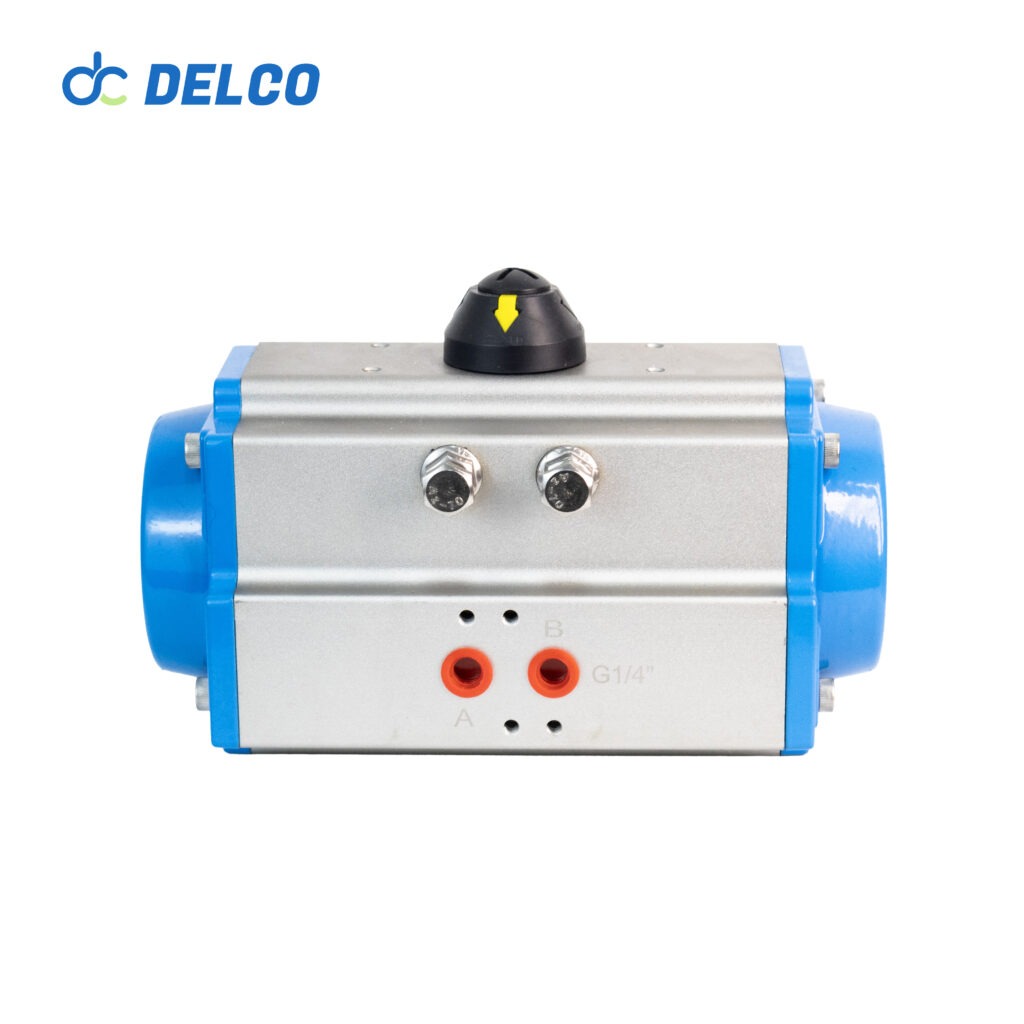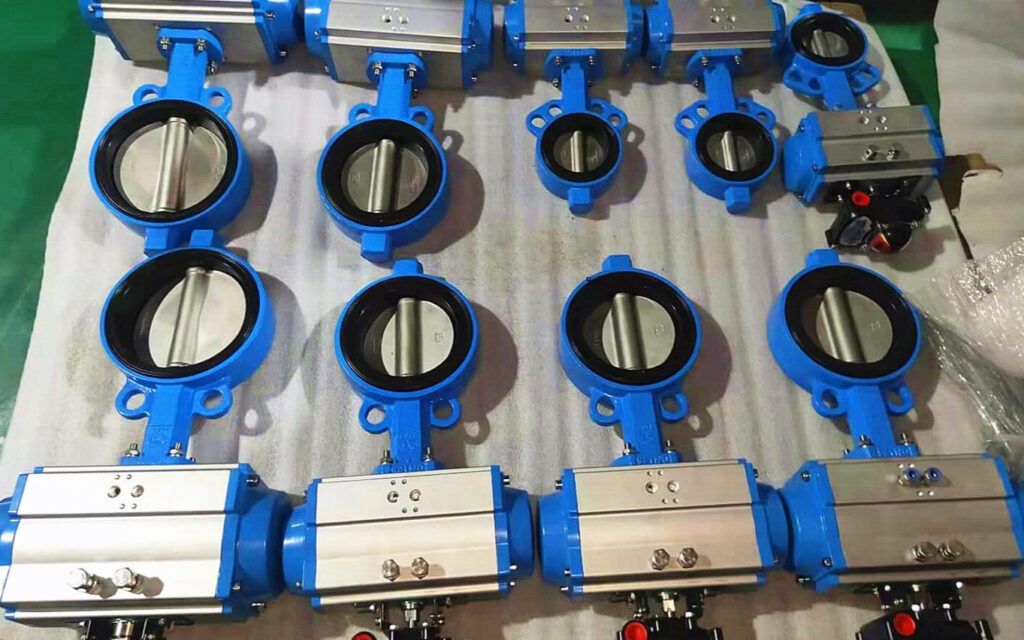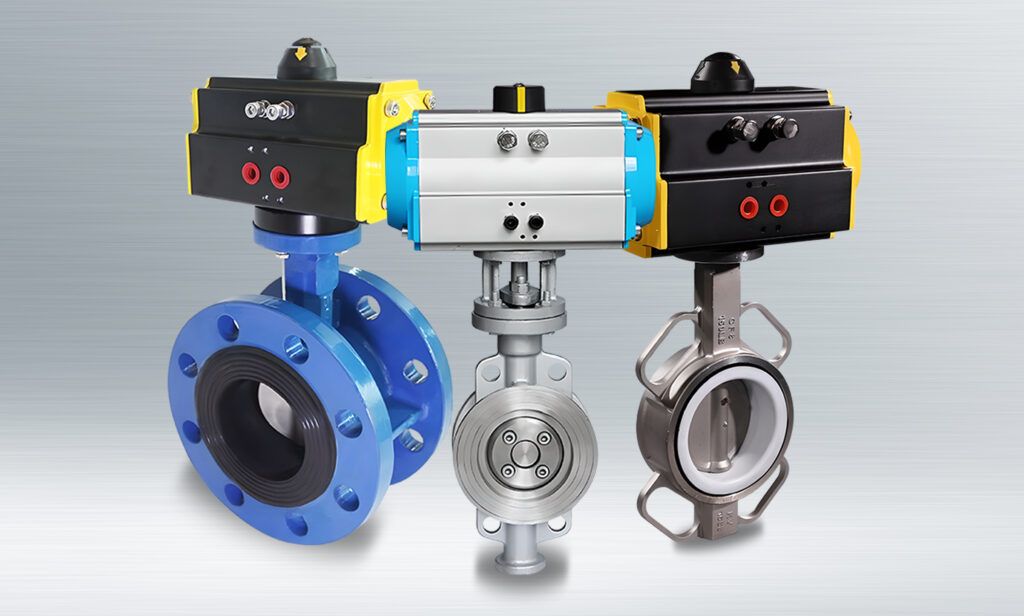Tech-Theorie: Technisch… Praktisch… Interessante Automatisierung Industrielle Lösungen
Bei DELCO-VentilWir wissen, wie wichtig Kundenzufriedenheit ist, und bemühen uns, die individuellen Bedürfnisse jedes Kunden zu erfüllen. Als zuverlässiger Ventillieferant sind wir bestrebt, hervorragenden Kundenservice und hochwertige Produkte zu bieten, um optimale Leistung und Langlebigkeit zu gewährleisten. Wenn Sie sich für DELCO als Ihren vertrauenswürdigen Steuerluftlieferanten entscheiden, profitieren Sie von maßgeschneiderten Ventilbaugruppen, die speziell auf Ihre Anforderungen zugeschnitten sind, die Effizienz steigern und Ausfallzeiten reduzieren.
Was sind Ventilantriebe?
Ventilantriebe sind Geräte zur Steuerung des Betriebs eines Ventils, die es ermöglichen, es je nach verwendeter Energiequelle automatisch oder manuell zu öffnen oder zu schließen. In Flüssigkeitssteuerungssystemen spielen Ventilantriebe eine entscheidende Rolle bei der Bestimmung der Effizienz und Sicherheit des Systems. Je nach Anwendung kann die Wahl der Betätigungsmethode – manuell, elektrisch, pneumatisch oder hydraulisch – die Systemleistung erheblich beeinflussen. Dieser Blogbeitrag bietet einen Überblick über verschiedene Ventilantriebe, ihre Vor- und Nachteile sowie typische Anwendungen.
Inhaltsverzeichnis
Ventilantriebe der Typen
1. Manuelle Antriebe
Manuelle Antriebe erfordern menschliche Kraft, um das Ventil zu bedienen. Normalerweise sind manuelle Antriebe mit Komponenten wie Hebeln, Handrädern oder Getrieben zum Öffnen oder Schließen von Ventilen ausgestattet. Diese Antriebe werden häufig in Systemen eingesetzt, in denen keine Automatisierung erforderlich ist, in Niederdrucksystemen oder wenn aus Sicherheitsgründen ein manuelles Eingreifen erforderlich ist.
Vorteile:
- Niedrige Kosten: Ideal für kostenbewusste Anwendungen.
- Einfache Struktur: Einfach zu warten und zu reparieren.
- Hohe Zuverlässigkeit: Funktioniert unabhängig von externen Stromquellen, nützlich in rauen Umgebungen oder bei Systemausfällen.
Nachteile:
- Erfordert körperliche Anstrengung: Die manuelle Bedienung kann arbeitsintensiv sein, insbesondere bei größeren Ventilen.
- Nicht für häufige Operationen geeignet: Begrenzt in Geschwindigkeit und Kraft.
- Keine Fernbedienung: Unterstützt keine automatische oder entfernte Ventilsteuerung.
- Herausforderungen in Hochdrucksystemen: Große Ventile oder Ventile in Hochdruckumgebungen lassen sich schwer manuell bedienen.
Häufige Anwendungen:
- Sanitärinstallationen im Wohnbereich
- Gartenbewässerungssysteme
- Not-Absperrventile
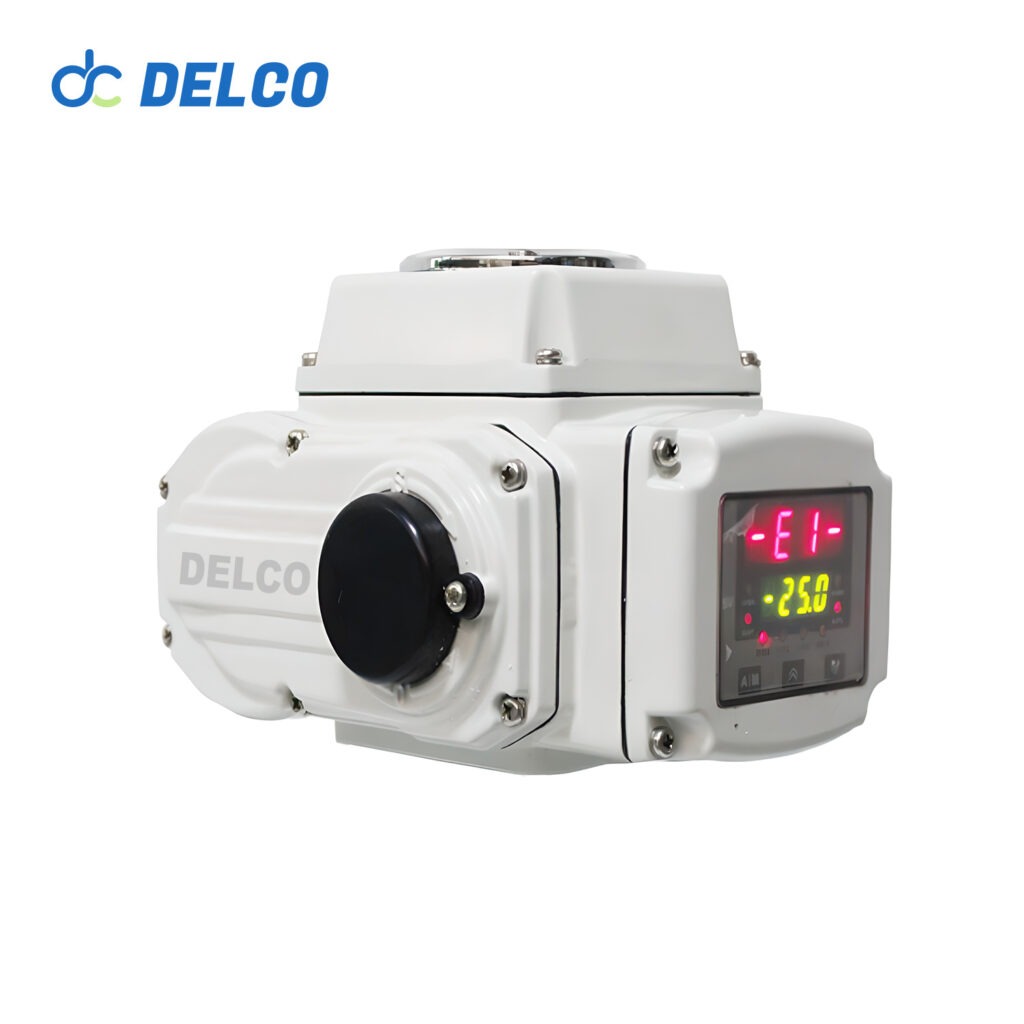

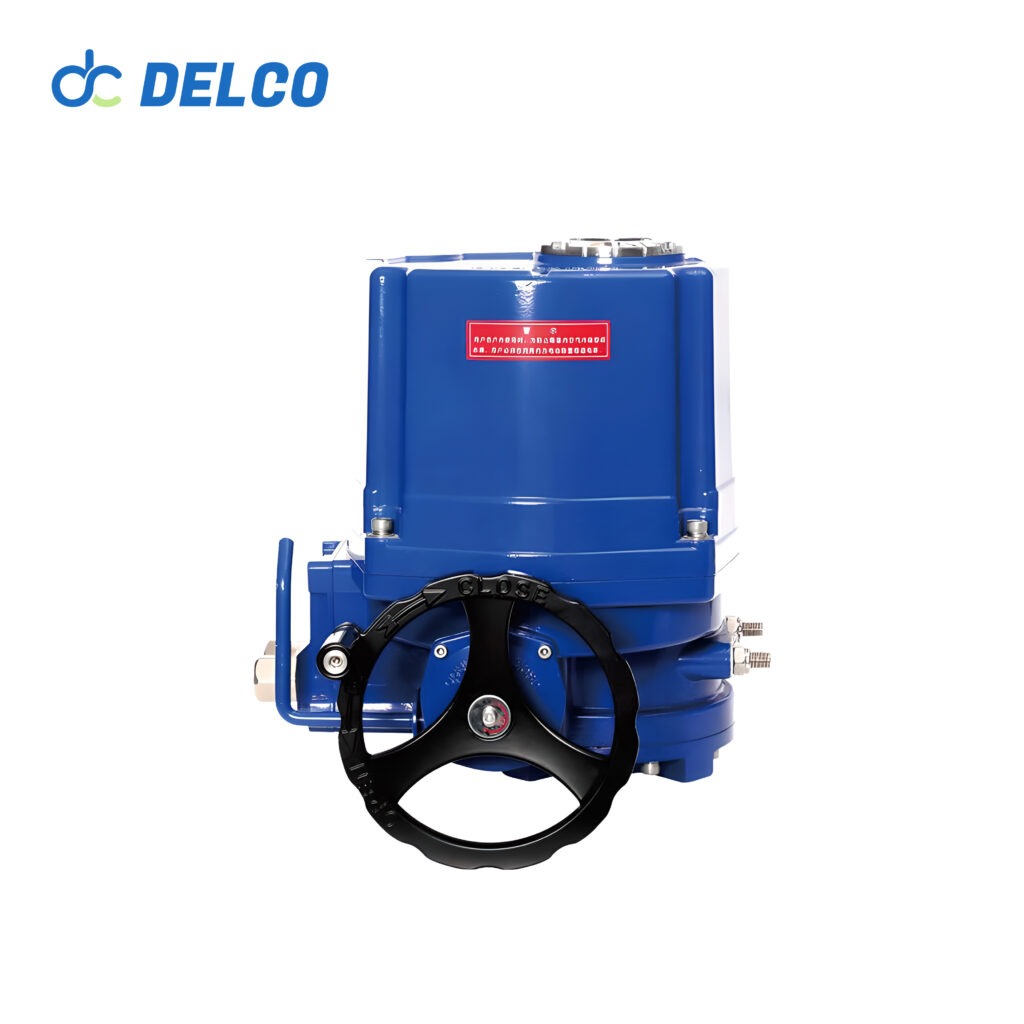
2. Elektrische Antriebe
Elektrische Stellantriebe nutzen elektrische Energie zur mechanischen Bewegung für den Ventilbetrieb. Diese Antriebe sind ideal für Systeme, die Automatisierung, präzise Steuerung und schnellen Ventilbetrieb erfordern. Elektrische Antriebe werden häufig in motorisierten Kugelhähnen und verschiedenen automatisierten industriellen Prozessen verwendet.
Vorteile:
- Schnelle Reaktion: Schnelles Öffnen und Schließen von Ventilen.
- Hohe Präzision: Ermöglicht präzise Steuerung und Integration mit modernen Steuerungssystemen.
- Energieeffizient: Im Vergleich zu anderen Antrieben sind elektrische Antriebe energieeffizienter.
- Sauberer und leiser Betrieb: Bietet leisere Leistung ohne Abgasemissionen.
Nachteile:
- Überhitzung: Elektrische Antriebe können bei starker Beanspruchung überhitzen.
- Begrenzte Kraft: Nicht für große Ventile mit hohem Drehmoment geeignet.
- Machtabhängigkeit: Ist auf eine stabile Stromversorgung angewiesen und daher bei Stromausfällen anfällig.
- Mögliche Schäden bei Stromausfall: Kann beschädigt werden, wenn das System unerwartet die Stromversorgung verliert.
Häufige Anwendungen:
- HLK-Systeme
- Automatisierte Wasseraufbereitungsanlagen
- Lebensmittel- und Getränkeverarbeitung
- Pharmazeutische Herstellung
3. Pneumatische Antriebe
Pneumatische Antriebe werden mit Druckluft betrieben und sind daher ideal für Anwendungen, die schnelle, wiederholte Ventilbewegungen erfordern. Diese Antriebe werden häufig in Systemen wie Förderbändern und Fließbändern eingesetzt, wo schnelle Reaktion und hohe Kraft erforderlich sind.
Vorteile:
- Kosteneffizient: Wirtschaftlich im Vergleich zu elektrischen und hydraulischen Antrieben.
- Schnelle Reaktion: Bietet eine schnelle Ventilbetätigung.
- Hohe Kraftabgabe: Pneumatische Antriebe können für große Ventile erhebliche Kraft bereitstellen.
- Umweltfreundlich: Druckluft ist eine saubere, umweltfreundliche Energiequelle.
Nachteile:
- Geringere Präzision: Pneumatische Antriebe sind weniger präzise als elektrische Antriebe.
- Luftversorgungsinfrastruktur: Erfordert ein zuverlässiges Druckluftversorgungssystem.
- Lecks: Luftlecks können die Effizienz verringern und den Wartungsbedarf erhöhen.
- Lärm: Pneumatische Systeme können Lärm erzeugen, insbesondere beim Ausblasen.
Häufige Anwendungen:
- Herstellung von Fördersystemen
- Automobil-Montagelinien
- Verpackungsmaschinen
- Chemische Verarbeitungsanlagen
4. Hydraulische Antriebe
Hydraulische Antriebe verwenden unter Druck stehende Flüssigkeiten, normalerweise Öl, um Kraft für den Ventilbetrieb zu erzeugen. Sie sind für Hochleistungsanwendungen ausgelegt und können große Ventile handhaben, wodurch sie für Branchen wie Öl und Gas sowie Bergbau geeignet sind.
Vorteile:
- Hohe Kraftabgabe: Hydraulische Antriebe können enorme Kräfte erzeugen und sind daher ideal für große oder Hochleistungsventile.
- Effizienter Betrieb: Kann große Ventile reibungslos und effizient bedienen.
- Position halten: Hydraulische Aktuatoren können eine Position halten, ohne zusätzliche Energie zu verbrauchen.
Nachteile:
- Hohe Kosten: Hydraulische Systeme sind in der Regel teurer in der Installation und Wartung.
- Flüssigkeitsleckage: Flüssigkeitslecks können zu Umweltgefahren führen und erfordern häufige Wartungsarbeiten.
- Komplexe Wartung: Erfordert zusätzliche Komponenten wie Pumpen und Behälter, und die Wartung kann komplizierter sein.
- Umweltrisiken: Lecks der Hydraulikflüssigkeit können gefährlich sein und erfordern sofortige Aufmerksamkeit.
Häufige Anwendungen:
- Öl- und Gasindustrie
- Bergbau
- Marine Anwendungen
- Metallverarbeitungsanlagen
Vergleich und Auswahl von Ventilantriebssystemen
Bei der Auswahl eines Ventilantriebssystems sollten mehrere Faktoren berücksichtigt werden, um optimale Leistung und Zuverlässigkeit sicherzustellen:
- Betriebsumgebung: Berücksichtigen Sie Umgebungsbedingungen wie Temperatur, Luftfeuchtigkeit und möglichen Kontakt mit brennbaren oder explosiven Materialien.
- Kontrollanforderungen: Bestimmen Sie, ob eine präzise Steuerung, schnelle Reaktionszeiten oder Automatisierung erforderlich sind.
- Kosteneffizienz: Bewerten Sie die Anfangsinvestition sowie die langfristigen Betriebs- und Wartungskosten des Systems.
- Sicherheit: Stellen Sie sicher, dass das ausgewählte System die Sicherheitsstandards erfüllt und unter allen Bedingungen zuverlässig funktioniert.
Abschluss
Die Auswahl des geeigneten Ventilantriebs ist für die Leistung und Effizienz von Flüssigkeitssteuerungssystemen von entscheidender Bedeutung. Manuelle, elektrische, pneumatische und hydraulische Antriebe bieten jeweils einzigartige Vorteile und eignen sich für unterschiedliche industrielle Anforderungen. Die beste Wahl hängt von Faktoren wie Umgebung, Steuerungsanforderungen, Kostenbeschränkungen und Sicherheitsaspekten ab.
Mit der Weiterentwicklung der Technologie werden Ventilantriebssysteme immer besser und bieten noch zuverlässigere und effizientere Lösungen für die industrielle Automatisierung. Achten Sie bei der Auswahl des richtigen Antriebs darauf, die spezifischen Anforderungen Ihres Systems sorgfältig zu prüfen, um einen langfristigen Erfolg sicherzustellen.
Warum entscheiden sich immer mehr internationale Ventilmarken für den OEM-Service von DELCO?
DELCO wurde 2011 gegründet und ist ein weltweit führendes Unternehmen im Industriesektor. Zu unseren Hauptprodukten zählen elektrische Stellventile, pneumatische Stellventile, Automatisierungsstellventile und Magnetventile. Seit fast 20 Jahren nutzen wir unsere Produkte, unser technisches Know-how und unsere industriellen Automatisierungslösungen, um unzählige industrielle Projektprobleme für unsere Kunden zu lösen, darunter Projekte in den Bereichen Lebensmittel, Getränke, Chemie, Wasseraufbereitung, Pharmazie, Erdgas, Öl und HLK. Wir haben derzeit fünf Tochtergesellschaften und mehr als 50 Vertriebspartner auf der ganzen Welt, die einen schnellen Reaktionsservice bieten.
Alle DELCO-Produkte durchlaufen einen internen Design-, Konstruktions- und Fertigungsprozess unter der Leitung hochqualifizierter und erfahrener Ingenieure. Dabei kommen italienische und deutsche Technologien zum Einsatz, um qualitativ hochwertige, sichere, zuverlässige und preiswerte Ventile, Antriebe und Lösungen herzustellen. Die Fertigungsstandards können durch die im Laufe der Jahre erworbenen Zertifizierungen nachgewiesen werden.
Und mit der Zertifizierung des Qualitätsmanagementsystems nach ISO 9001:2015 sowie vielen weiteren Zertifizierungen wie SGS, RoHS, CNEX, TÜV, CE, FDA beweisen diese Zertifizierungen, dass DELCO bei der Herstellung seiner Produkte die weltweit höchsten Qualitäts- und Sicherheitsstandards einhält.
Wie erhalte ich schnell ein Angebot für Industrieventile?
Wenn Sie Fragen zu Ventilen haben oder ein Angebot wünschen, können Sie sich gerne an uns wenden. Wir werden Ihnen innerhalb von 6 Stunden antworten. Telefon: +86 159 8960 2972, WhatsApp: +86 159 8960 2972 oder E-Mail: [email protected].
DELCO-Ventil Qualität, wettbewerbsfähige Preise und hervorragender Service machen uns zum besten Ventilpartner, der Sie beim Ausbau Ihres Geschäfts unterstützt. Passen Sie Ihre Ventile individuell an, wir haben keine Mindestbestellmenge.
Bei DELCO wissen wir, wie wichtig Kundenzufriedenheit ist, und bemühen uns, die individuellen Bedürfnisse jedes Kunden zu erfüllen. Als zuverlässiger Lieferant von Regelventilen sind wir bestrebt, hervorragenden Kundenservice und hochwertige Produkte zu bieten, um optimale Leistung und Langlebigkeit zu gewährleisten. Wenn Sie sich für DELCO als Ihren vertrauenswürdigen Lieferanten von Regelventilen entscheiden, profitieren Sie von maßgeschneiderten Ventilbaugruppen, die speziell auf Ihre Anforderungen zugeschnitten sind, die Effizienz steigern und Ausfallzeiten reduzieren.
Darüber hinaus können Sie dank unserer wettbewerbsfähigen Preise für elektronische Druckregler erstklassige Lösungen anbieten. Als einer der führenden Hersteller von Regelventilen sind wir stolz darauf, zuverlässige Ventile zu liefern, die nicht nur den Industriestandards entsprechen, sondern auch zur Gesamtrentabilität Ihres Unternehmens beitragen. Durch eine Partnerschaft mit DELCO können Sie beruhigt sein, denn Sie treffen eine kluge Wahl für den langfristigen Erfolg Ihres Unternehmens.


